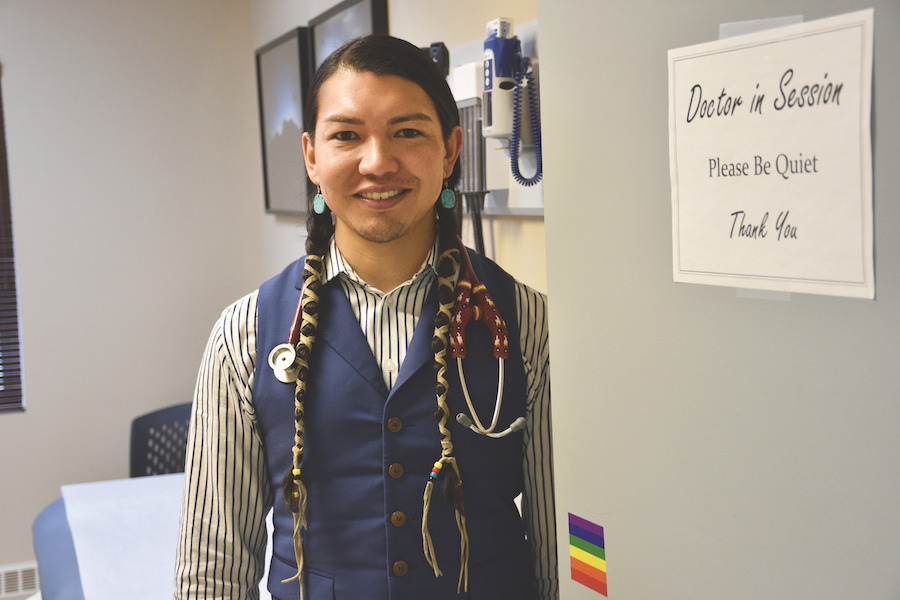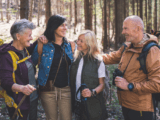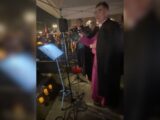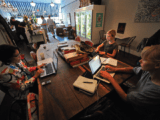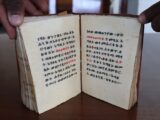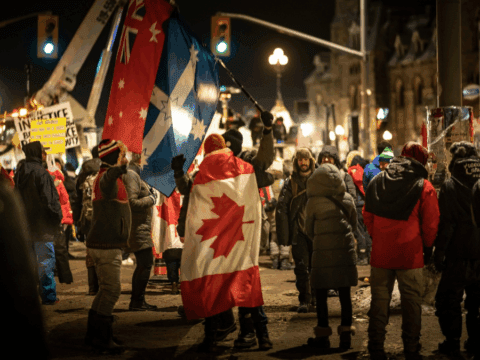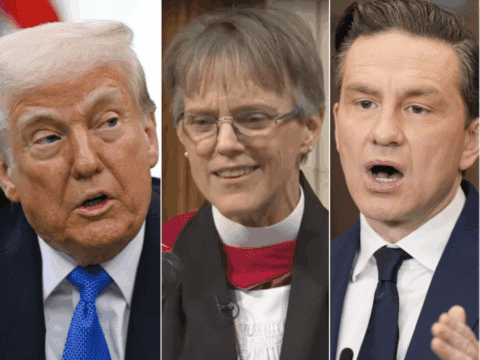More than 12,000 transgender and non-binary people call Alberta home, but wait times and a lack of expertise and information often keep patients in the province from accessing proper care. Dr. James Makokis operates a clinic for transgender patients in Amiskwaciy-wâskahikan (Edmonton). For many trans Indigenous folks, he is the only physician who understands their needs.
As a Nehiyô (meaning “people of the four directions”) person of Onihcikiskwapiwinihk (Saddle Lake Cree Nation), Makokis has gained wide recognition for implementing traditional Cree approaches to medicine into his practice. In 2019, Makokis and his husband, Anthony Johnson, won the seventh season of Amazing Race Canada. He spoke to Alison Brooks-Starks.
You may unsubscribe from any of our newsletters at any time.
ALISON BROOKS-STARKS: How do you speak about what it means to be Two-spirit?
DR. JAMES MAKOKIS: I never knew that word growing up. It was my mom who actually asked me if I knew what it was. I don’t know if that was her roundabout way of asking if I was gay or not. Two-spirit is the intersection of gender, sexuality, Indigeneity and spirituality; it is an English phrase that is working to describe Indigenous concepts of gender and sexual diversity. At the same time, it’s important for us to remember the Cree words for these identities — that reflect and embody these teachings. One of the words that has come back to us recently is the teachings of tastawiyiniwak, which are “the in-between people.” I learned of it through a knowledge keeper named Jeffery Meechance, who in turn learned it through his grandmother, Vera.
ABS: Do you remember your first two-spirit gathering?
JM: It was incredible. It was the first time I saw two-spirit drummers and two-Spirit dancers — whether they were assigned male at birth and dancing in female roles and categories or assigned female at birth and dancing in male roles and categories. Everyone was just completely and fully themselves. It actually made me cry because it was such an inclusive and accepting space. It really encouraged me to start powwow dancing. I’m not a good chicken dancer at all.
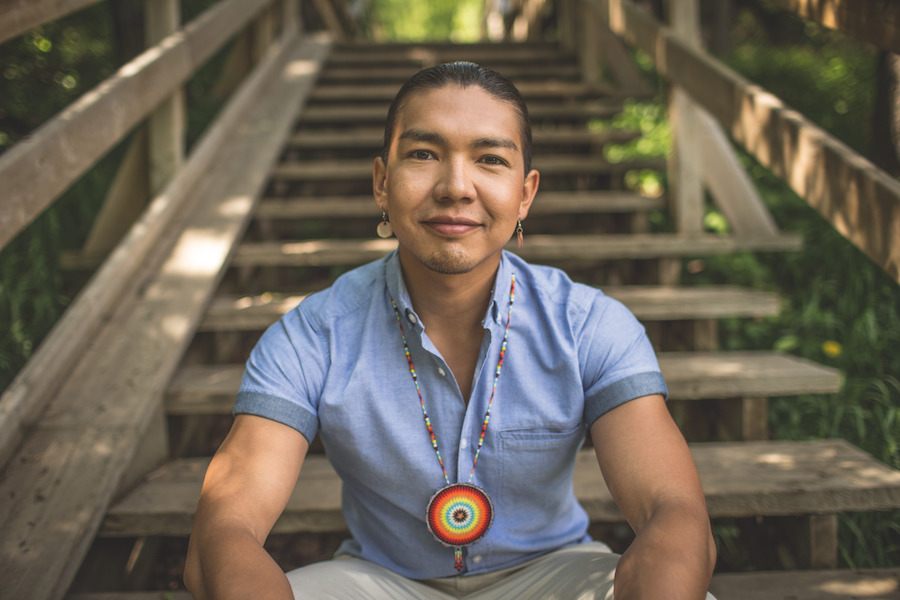
ABS: I have heard you say that when Two-Spirit youth come to your practice and see someone who looks like them — same skin colour, long hair in braids — they feel there’s finally someone who really understands.
JM: It’s so exciting when I have a young Indigenous Two-Spirit youth come in. It’s a time for validation and affirming that there’s nothing wrong with them — that they’re beautiful spirits who have so much to share with the world and their families. You can immediately see the transformation in how they think of themselves.
ABS: Why do you think this type of care is so significant?
JM: When people finally have the chance to access it and be their true selves, a lot of their issues and challenges related to mental health, self-harm or suicidality disappear or become more manageable. In pre-colonized societies, if somebody was Two-Spirit or tastawiyiniwak, they would just be accepted as a male or a female or a non-binary person within our nations. That’s one of the reasons why I practise transgender medicine. From an Indigenous perspective, it is helping to restore the space and role that people occupied in the past. At appointments, I share some of our Nehiyô teachings around gender and sexuality. These teachings are embedded in our culture, world view, ceremonies and spirituality.
More on Broadview:
- United churches determined to stand up for LGBTQ2S+ kids as anti-trans hate rises
- Why anti-LGBTQ2S+ protests are hurting racialized trans and queer people in faith communities
- After 30 years, Albert McLeod continues to blaze a trail for queer Indigenous people
ABS: I’m hearing that there is a strong intersection of health and culture. How does ceremony help the health of your patients, especially young patients?
JM: I’m working with artist Lana Whiskeyjack and her husband, James Lamouche, as well as my husband, Anthony Johnson, and Dr. Dionne Gesink in Toronto to create rites of passage for Two-Spirit and transgender youth. In our language, we say Kihkosimowin. It means “fasting,” where we put people out into the bush or mountains or sacred spaces for four days and four nights without food or water.
At the end of that experience, the young person would come out having completed this really important event that very few people in the world have gone through, and they would be acknowledged as an adult in their community. And if they’re transitioning from a girl into a young man or from a boy into a young woman, or if they are someone who’s non-binary, they would be acknowledged as who they are in their role in the community. That’s really what needs to be done to help young people be resilient and strong — to be healthy and successful.
It worked in the past, and then it was disrupted by the violence of colonization.
We need to bring those ceremonies back to life for our young people, because they have such a hunger and thirst for Indigenous knowledge.
ABS: To be able to offer that support to youth, what do communities need?
JM: One of the things we’re actively working toward is finding land near the mountains with a forested area, hopefully with a stream. When I think of allyship and the agreements that we’ve made in treaty with our non-Indigenous allies, these are some of the practical things that can assist Indigenous people. We never agreed to give up our lands, and when we want to use them for ceremonial purposes or health purposes, it’s important for us to have access to safe spaces.
ABS: Speaking of allyship, none of the health-related calls in the Truth and Reconciliation Commission have been completed yet. One call includes implementing health-care rights of Indigenous people as identified under the treaties. How might health care look if Treaty No. 6 was realized?
JM: It’s important for people to know that the government and churches have intentionally and systematically dismantled Indigenous health systems.
Our health systems — which include our ceremonial, spiritual and medicinal practices, along with the process of how we engage in healing — are almost on the verge of extinction. They were intact before colonization. They allowed our people to lead fulfilling lives with very minimal illness, and routinely live to well over 90 or 100 years of age.
It innately makes sense that we rebuild the Indigenous health system to transform those statistics back into what they used to be. This will ensure that an individual has access to all of the preventative, ceremonial and health interventions and medicine throughout their seven stages of life. Until that happens, we will continue to see deficits in Indigenous health. We need to ensure that in all areas of Indigenous health, there are no barriers for people to access pharmaceutical drugs or medical equipment, supplies or services. That is what the “medicine chest” is supposed to be, and it has been severely restricted in its interpretation by the federal government.
ABS: When you and your husband were on Amazing Race Canada in 2019, people were rooting for you every step of the way. Some folks would smudge their television screens. What do you think it meant for people to see positive Indigenous and Two-Spirit representation?
JM: More than four years later, people still share with us how the show impacted their lives. We hear it all the time: our appearance gave their lesbian daughter the strength and courage to come out to their mom; that a grandmother accepted their trans grandchild; that families would talk about what it meant to be in a same-sex relationship; or that a family member accepted their lesbian child or sister.
We challenged stereotypes. My husband, Anthony, is a Harvard-educated individual who’s very brilliant, and I’m a physician. We’re married, and we live a traditional Indigenous lifestyle. Representation helps Two-Spirit people to be seen as just like everybody else — as people who laugh, cry, struggle and are also funny! It’s really important to see the humanity in people.
This interview has been edited and condensed for length and clarity.
***
Alison Brooks-Starks writes and leads eco-therapy retreats in Edmonton.
This article first appeared in Broadview’s January/February 2024 issue with the title “The Two-Spirit Doctor.”

